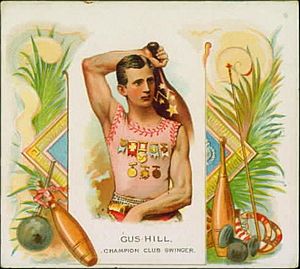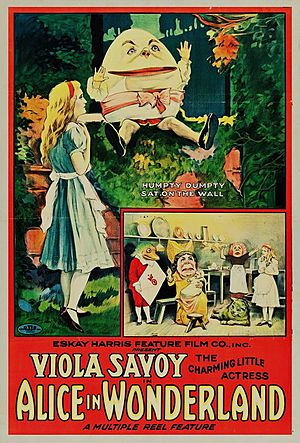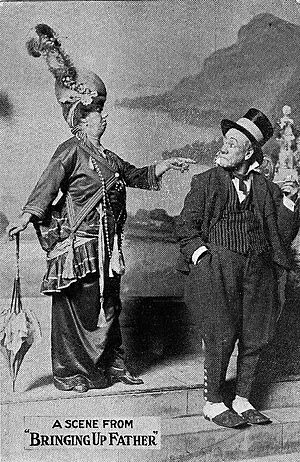Gus Hill facts for kids
Quick facts for kids
Gus Hill
|
|
|---|---|
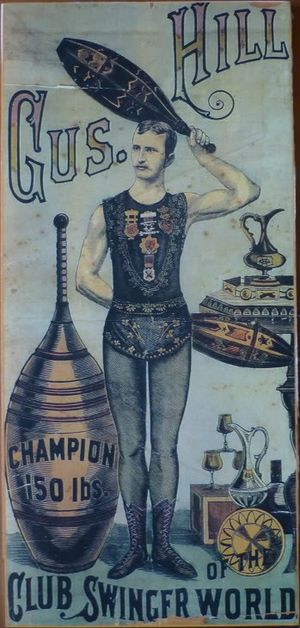
Gus Hill circa 1880
|
|
| Born |
Gustave Metz
22 February 1858 New York City, New York, USA
|
| Died | 20 April 1937 (aged 79) New York City, New York, USA
|
| Nationality | American |
| Occupation | Vaudeville entrepreneur |
| Known for | Cartoon theatricals |
Gus Hill (born Gustave Metz, 1858–1937) was a famous American entertainer and show producer. He started as a vaudeville performer, known for juggling Indian clubs. Later, he became a successful businessman in the entertainment world, creating and managing many shows.
Gus Hill helped start the Columbia Amusement Company, which was a big group of burlesque shows and theaters. He even became the president of the American Burlesque Association. He also produced plays and musical comedies. One of his most popular ideas was "cartoon theatricals." These were live musical shows based on popular comic strips. At one point, he was managing fourteen different shows all at once!
Contents
Gus Hill's Early Life and Talents
Gus Hill was born Gustave Metz in New York City on February 22, 1858. His parents, Gustave and Martha Metz, had moved to America from Germany. Gus was the oldest of three brothers. His father owned a sawmill and a furniture factory.
Gus Hill was a natural athlete. He first became a wrestler, then discovered his talent for juggling. He became very good at juggling heavy Indian clubs. He chose the stage name "Hill" from a popular sports club in Manhattan called Harry Hill's.
When Gus was eighteen, in 1876, he performed as a club juggler in a vaudeville show at Tony Pastor's theater in New York. He would travel around the country, challenging local jugglers to compete. He had a clever trick: the first time he performed in a town, he would let the local juggler win. Then, when he returned for a second show, he would challenge them again. This guaranteed a huge audience, and then he would win! This helped him earn the title "Champion Clubman of the World."
Becoming a Vaudeville Show Manager
Gus Hill soon started managing shows, even though he kept performing for another ten years or more. In the 1885–86 season, he produced Gus Hill's Mammoth Novelty Company. He even performed his Indian club act in it. The next year, he produced Gus Hill's World of Novelties, which featured new performers like Joe Weber and Lew Fields.
Hill created musical comedies that were affordable for audiences outside of Broadway. He was very good at saving money. For example, the scenery for his shows was designed to fold up easily into special trunks. This saved space and made traveling cheaper. He also reused old costumes and hired performers who were not yet famous or were past their peak, so they didn't cost as much.
By 1892, Hill had a second company called Gus Hill's New York Vaudeville Stars. His shows ran from Monday to Saturday each week, including afternoon shows on Wednesdays and Saturdays. Hill handled all the travel plans. Typically, the show would move to a new city by train on Monday mornings. The performers would stay in boarding houses, some of which Hill owned himself. Sharing rooms and getting meals at the boarding house helped keep costs low, but the performers were still comfortable.
By 1896, Gus Hill was one of the wealthiest show promoters. A reviewer described one of his shows in Chicago that year, mentioning many popular acts like singers, musicians, a ventriloquist, and even midget boxers!
For the 1896–97 season, Hill added three burlesque companies and a new "cartoon theatrical" called McFadden's Row of Flats. In 1898, he launched Gus Hill's Ideal Minstrels. He also produced plays written by Owen Davis. The next year, he introduced the Royal Lilliputians, which was a show featuring unique performers. Famous comedians like Billy Reeves and Eddie Cantor also performed in his vaudeville shows.
Burlesque and Other Ventures
Gus Hill's burlesque shows, like Gus Hill's Aggregation and Gus Hill's Stars, were cleaner than many others. They also included a variety of acts. Gus Hill was one of sixteen producers who started the Columbia Amusement Company in 1902. He claimed credit for the "Columbia Wheel" idea, where different show companies would travel around a circuit of theaters.
Hill produced three burlesque shows each season for Columbia until the early 1910s. Then, he focused more on his popular Mutt and Jeff shows. In 1915, the Columbia Company created a new group called the American Burlesque Association, and Gus Hill became its president.
Hill also supported many African American shows. One of these was Gus Hill's Smart Set Company, which featured talented performers like Billy McClain and Ernest Hogan. This group put on vaudeville-style shows with comedy, songs, dances, and special acts. From 1904 to 1908, Gus Hill's Smart Set toured with a musical comedy called The Black Politician.
At this time, Gus Hill was managing fourteen different shows! He even had a mule that became a sensation on stage. In 1909, Salem Tutt Whitney and J. Homer Tutt formed the Whitney Musical Comedy Company, which toured under Hill's management as the Southern Smart Set Company.
In 1914, Hill tried making movies with his Nonpareil Feature Film Company. They released a film called The Line Up at Police Headquarters. Hill also planned to make short films based on the Happy Hooligan cartoon, but they never appeared. Nonpareil did release a version of Alice in Wonderland in 1915, starring Viola Savoy. After that, the film company seemed to close down.
Amazing Cartoon Theatricals
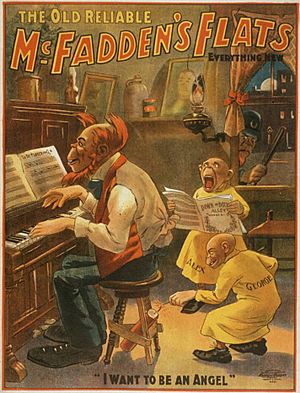
A "cartoon theatrical" was a live stage show based on a comic strip. Between 1896 and 1927, over two hundred such shows were produced, and Gus Hill was involved in more than half of them!
In the 1890s, Hill started a vaudeville act based on The Yellow Kid, a cartoon from the New York Sunday World. He later added characters from other popular cartoons like Mutt and Jeff and Happy Hooligan. He also created shows based on Alphonse and Gaston and Bringing Up Father, among others. Most of these theatricals were musical comedies. Hill continued to produce these cartoon musicals into the 1920s. They would first play in regular theaters, then move to Hill's burlesque circuits.
The Yellow Kid cartoon had a series called McFadden's Row of Flats. Gus Hill's stage version of McFadden's Row of Flats opened in London in 1896. The play was a funny comedy about two characters, Dan McFadden (an Irish stereotype) and Sandy McTavish (a Scottish stereotype). Another part of the story was McFadden's daughter, who went to finishing school and became too "ladylike" to recognize her father in public. In the end, McFadden's daughter married McTavish's son, and everyone was happy. This play was even made into silent films in 1927 and 1935.
Gus Hill's Mutt and Jeff shows, and their sequels like Mutt and Jeff in Panama (1913–14) and Mutt and Jeff in College (1915–16), ran for many years, from 1910 to 1928. At one point, six different companies were performing the show in different places! In 1922, Hill even staged a version of Mutt and Jeff performed by Conoly's Colored Comedians in New York. A reviewer said it was a "very complete evening's entertainment" for any audience.
Hill first staged Happy Hooligan in the early 1900s, and a version of that show was still running in 1923–24. His Bringing up Father show ran from 1913 to 1933, sometimes with three companies performing it at once.
By the late 1920s, the Columbia Burlesque Circuit faced financial challenges. This was the last time cartoon theatricals were a major part of burlesque shows. Gus Hill produced Gus Hill's Midgets in 1929, which marked the end of his career as a producer. However, he continued to perform his club juggling act at charity events and nostalgia shows.
Gus Hill passed away from a heart attack in New York City on April 20, 1937, at the age of 79.
Gus Hill's Broadway Shows
Here are some of the shows Gus Hill produced that made it to Broadway:
- Southern Enchantment (a musical comedy) in 1903
- In Posterland (a musical comedy) in 1903
- Spotless Town (a musical comedy) in 1903
- Happy Hooligan (a musical comedy) in 1903
- Around the Clock (a musical comedy revival) in 1908
- Bringing Up Father (a musical comedy) in 1925


